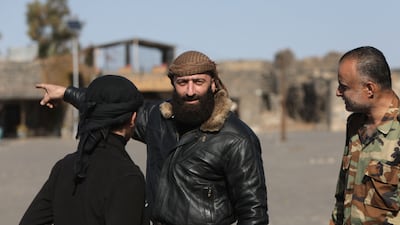A militia controlling a strategic area of southern Syria has disbanded after coming under political and military pressure from the new government in Damascus, in a boost to President Ahmad Al Shara's drive to bring all armed groups in the country under its control.
The peaceful dissolution of the 3,000-strong Eighth Brigade militia, announced by its spokesman late on Sunday, follows a new approach by the central authorities in dealing with holdout groups, based on projecting strength while trying to avoid major confrontation.
The government faced an international outcry after its campaign to quell opposition in Syria's coastal region, the heartland of the Alawite sect that formed the core support of ousted president Bashar Al Assad, flared up into sectarian massacres last month.
A video statement from spokesman Akram Al Horani said the Eighth Brigade, which had controlled areas near the border with Jordan in southern Syria for the past seven years, had "completely disbanded" and started handing over its weapons to the government to "strengthen security and stability and the sovereignty state".
Mr Al Shara's militant group Hayat Tahrir Al Sham (HTS), formerly affiliated with Al Qaeda, led a rebel offensive that toppled Mr Al Assad in December, ending nearly 14 years of civil war. Since then his government has been seeking establish control over the country by incorporating the myriad militias, mostly formed during the civil war, into a new national army, with posts for their leaders, or by crushing them. On March 6, HTS forces overran the southern city of Sanamayn, ending a threat from a warlord called Mohammad Al Humaid, who had refused to disband.
The Eighth Brigade, whose power base was centred in and around the historic city of Busra Al Sham, refused to join the new army despite having committed to do so in January, mainly because its leader Ahmad Al Odeh was not offered a senior position, an HTS official told The National.
"If his force was larger, he would have been given a high rank in the new army," the official said.

A predecessor to the Eighth Brigade, also led by Mr Al Odeh, was part of a southern rebel coalition that waged an insurgency in southern Syria with US and Arab backing until 2018, when the US struck a deal with Russia for the Assad regime to take most of the area. However, Mr Al Odeh managed to preserve a large degree of independence from the regime by striking a deal with Moscow to become its surrogate.
But this time Mr Al Odeh was outmanoeuvred. The HTS official said the killing last week in Busra Al Sham of Bilal Al Masatfeh, a former militia ally of Mr Al Odeh who had turned against him and allied with HTS, set in motion a chain of events that eventually led to the Eight Brigade's surrender.
Mr Al Masatfeh belonged to Al Mekdad, a large clan in Busra Al Sham. Fearing a popular backlash, Mr Al Odeh agreed to hand over four men suspected of killing Mr Al Masatfeh to the central authorities. But instead of sending a small force to collect the four men, an armoured force of 1,200 HTS fighters entered Busra Al Sham at the weekend, residents say.
An Eighth Brigade commander, who did not want to be named, told The National Mr Odeh contemplated attacking the HTS force but did not do so because it would ultimately have been a "losing battle".
"We had the power to besiege them in Busra Al Sham, but this would have been an excuse [for Mr Al Shara] to respond with a whole army," the commander said.
The HTS official said the government was unlikely to pursue Mr Al Odeh, whose whereabouts are not known, because it had achieved its objective of neutralising his militia.
The new government's efforts to extend its authority received another boost at the weekend when Kurdish militias ceded a significant degree of control over two key areas under a deal between their leader, Mazloum Abdi, and Mr Al Shara, signed last month. Government security forces entered Sheikh Maqsoud, the main Kurdish neighbourhood of Aleppo that is situated on a hilltop near the city's northern outlets. On the edge of Aleppo governorate, government forces also took control of the Tishreen Dam on the Euphrates river, which had been in the hands of Kurdish forces for a decade.


